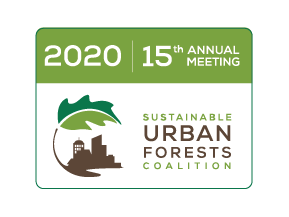February 2020 Note from the Chairs
In This Issue:
- Details on our upcoming Annual Meeting, including our four Networking Initiative Collaborators
- US involvement in the One Trillion Trees Initiative
- Capitol Hill briefing on UCF hosted by the National Association of State Foresters
SUFC’s 15th Annual Meeting Set for March 4

SUFC will be hosting its 15th Annual Meeting on March 4, 2020, from 9 to 5pm, at the University of Virginia Darden Sands Family Grounds in Arlington, Virginia. Please register today, as space is filling quickly.
Our two themes for this year’s meeting are:
1) Creative Funding Strategies for Urban & Community Forestry; and
2) New Technologies for Urban Forestry.
We are pleased to announce our four Collaborators for the Meeting’s Networking Initiative. We believe their projects will help to inspire the SUFC membership and the broader UCF community at large to think outside of traditional mechanisms.
- Natural Areas Conservancy will present on building national support for urban forested natural areas.
- National Recreation and Park Association will lead a discussion on policy actions needed to promote urban forested natural areas.
- The University of British Columbia’s Urban Forestry in Action Lab will give a presentation on ways to harness technology, such as computer vision and artificial intelligence, to assess urban forests.
- The University of Maryland’s Environmental Finance Center will discuss ways to standardize the return on investment in urban and community forestry resources.
Following our meeting, we will hold a reception at the U.S. Botanic Garden from 6 to 8pm. Please RSVP here to attend.
SUFC launched a new initiative for this year’s meeting – inviting students (18 years or older) and young professionals who are pursuing careers in fields related to urban forestry to attend the 15th Annual Meeting and engage with SUFC members. Applications are currently being reviewed.
Trump Announces US Will Join One Trillion Trees Initiative
On January 21, President Trump announced that the United States would join the World Economic Forum’s One Trillion Trees Initiative. The initiative is designed to help combat climate change and began after an ecologist last year claimed that planting one trillion trees could neutralize carbon dioxide emissions. SUFC is strategizing with fellow stakeholders on implementation.
National Association of State Foresters Holds Briefing on Capitol Hill
On February 12, the National Association of State Foresters held a briefing on Capitol Hill to discuss the benefits urban and community trees provide and the ways state foresters are working to restore their health and resilience across the country. State foresters from Nebraska, Virginia, and South Dakota discussed real-world examples of what state forestry agencies do and explained how the Urban and Community Forestry Program supports their work.